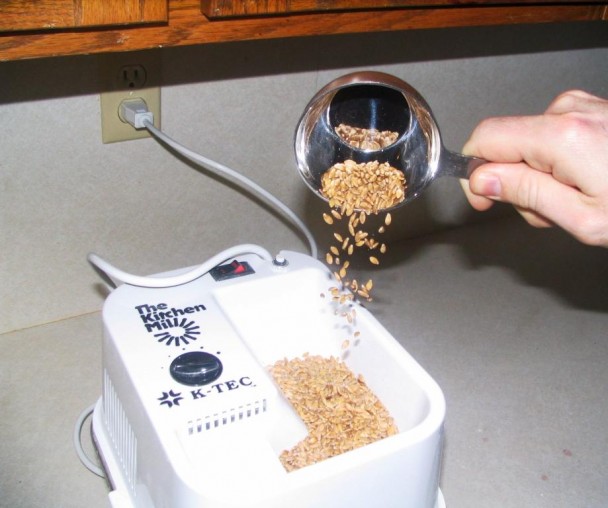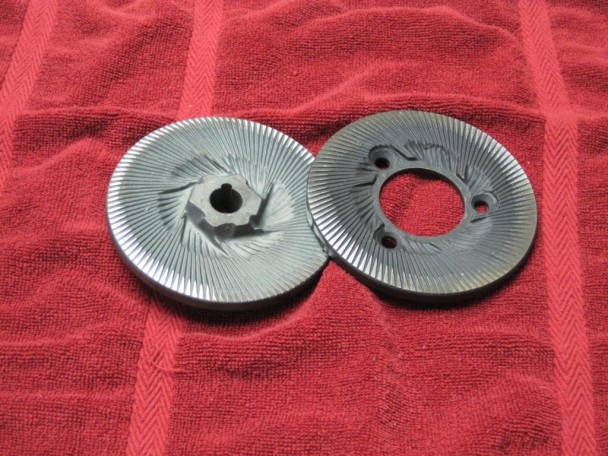
Fresh whole grain goodness on it's way to become finely ground flour!
I just ground some fresh whole-grain einkorn flour. It’s beautiful, slightly yellow and about as soft as powdered sugar. The household grain mill that I used did an awesome job. I can’t wait to make pancakes!
There are many different mills on the market that are easy to use and not too expensive. The big draw for most people in owning your own grain mill is the taste of baked goods made with freshly ground whole grains and the satisfaction of just knowing that you’re getting pure whole-grain goodness with all the nutrients you can possibly get from your grain. Flour bought in a bag from the store loses a large portion of it’s vitamins by the time you get it.
Personally, I own two household grinders: the K-Tec Kitchen Mill and the Country Living Grain Mill. I like the K-Tec for it’s speed and the superfine texture it can grind the grain to. I like the Country Living Grain Mill for it’s versatility, control over the fineness of the flour and relatively efficient hand-grinding.
Household grinders fall into three basic categories: 1) Ceramic Stone Grinders, 2) Steel Burr Grinders and 3) High-speed Impact Grinders. Like most things in life, these have their advantages and disadvantages. So, I’ll list them here and let you decide which is the right type for you and your family.
Ceramic Stone Grinders
Advantages:
- Grinds finer flour than burr grinders and is on par with high-speed impact grinder.
- Adjustable coarseness: ranges from cracked wheat and fine flour.
- Good in a power failure or emergency (if your unit can be hand-turned).
Disadvantages:
- Manual stone grinders are usually harder to turn than manual burr grinders.
- Stones will gum up almost instantly if you try to grind oil bearing seeds.
- Slow and tiring if you are turning by hand.
Steel Burr Grinders
Advantages:
- Grinds oil bearing seeds as well as dry grains – burrs will not gum up.
- Adjustable coarseness: ranges from racked wheat and fine flour.
- Resists damage if you miss a stone in your grain. (I always sort through my grain before milling.)

High Carbon Steel burrs from Country Living Grain Mill
- If you are turning by hand, these are generally easier than stone grinders
- Good in a power failure if it can be hand-turned.
Disadvantages:
- Will not grind quite as fine as a ceramic stone grinder.
- Slow and tiring if you are turning by hand.
High-speed Impact Grinders
Advantages:
- Grinds grain into very fine flour.
- Grinds grain very quickly.
- No sweat dripping down your face afterward.
Disadvantages:
- Very loud (I use ear plugs when using mine…problem solved.)
- May self-destruct if you miss a large stone in your grain. (REPEAT: Always sort through your grain before milling.)
- Impossible to completely clean it out if you want to avoid mixing with other types of grain. (Think allergies.)
- Even on the coarsest setting the flour comes out pretty fine. No “cracked wheat” or graham flour here.
- Must have electricity. (This would be important in the event of an extended power failure.)
My in-laws (and their ill-prepared neighbors) were glad they had extra food stored at their house when hurricane Fran steamrolled Raleigh, NC in 1996. Store shelves were bare before the first rain-drop even fell on land and the power was out on their street for more than a week. There is a lot that goes into emergency preparedness and having an appropriate grinder on hand might be an important step.

Where can one buy einkorn in the U.S.?
At growseed, see the website. http://www.growseed.org/einkorn.html
I so want to take a closer look at some of the memorabilia!
I truly like em. It’s unlike you use these out walking on town consumers. That’s what earbuds are for.
As we tend to were preparation for our own last transfer, Sarah along with I boxed up a majority of our CD collection.